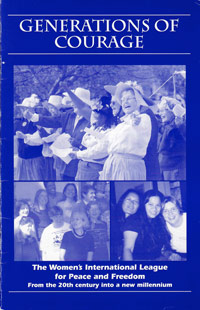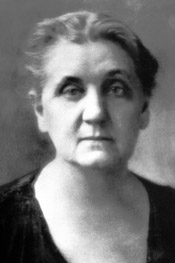History
Published on August, 13 2012
 Download Generations of Courage, a 16-page booklet on the history of WILPF.
Download Generations of Courage, a 16-page booklet on the history of WILPF.
WILPF was founded in 1915 during World War I, with Jane Addams as its first president. WILPF works to achieve through peaceful means world disarmament, full rights for women, racial and economic justice, an end to all forms of violence, and to establish those political, social, and psychological conditions which can assure peace, freedom, and justice for all.
WILPF works to create an environment of political, economic, social and psychological freedom for all members of the human community, so that true peace can be enjoyed by all.
On April 28, 1915, a unique group of women met in an International Congress in The Hague, Netherlands to protest against World War I, then raging in Europe, to suggest ways to end it and to prevent war in the future. The organizers of the Congress were prominent women in the International Suffrage Alliance, who saw the connection between their struggle for equal rights and the struggle for peace. WILPF's foremothers rejected the theory that war was inevitable and defied all obstacles to their plan to meet together in wartime. They assembled more than 1,000 women from warring and neutral nations to work out a plan to end WWI and lay the basis for a permanent peace. Out of this meeting the Women's International League for Peace and Freedom was born.
 WILPF's first International President was Jane Addams, founder of Hull House in Chicago and the first U.S. woman to win the Nobel Peace Prize.
WILPF's first International President was Jane Addams, founder of Hull House in Chicago and the first U.S. woman to win the Nobel Peace Prize.
Read more about Jane Addams, WILPF's founder, on the Nobel Prize website.
It was the wisdom of our founding foremothers in 1915 that peace is not rooted only in treaties between great powers or a turning away of weapons alone, but can only flourish when it is also planted in the soil of justice, freedom, non-violence, opportunity and equality for all. They understood, and WILPF still organizes in the understanding, that all the problems that lead countries to domestic and international violence are all connected and all need to be solved in order to achieve sustainable peace.
This remarkable vision still guides us today as we face the challenges of the twenty-first century. In today's context this means
- the equality of all people in a world free of sexism, racism, classism, and homophobia,
- the guarantee of fundamental human rights including the right to sustainable development,
- an end to all forms of violence: rape, battering, exploitation, intervention and war,
- the transfer of world resources from military to human needs, leading to economic justice within and among nations, and
- world disarmament and peaceful resolution of international conflicts via the United Nations.
WILPF celebrated 100 years in 2015 with a Congress at the Hague to celebrate! Check out this article for a perspective on that amazing event.



